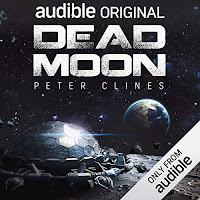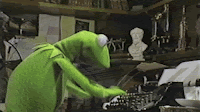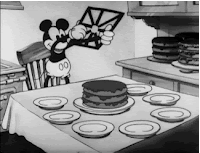It’s been another six months and a few things have happened, so I thought it’d be worth updating this…
One aspect of being on social media a lot is getting asked questions. Which is overall fun and cool. But some times I get asked the same questions. Again and again. I suppose you could say they’re… frequently asked. This is less fun and cool.
The ugly truth is it can really wear on you to answer the same questions again and again because some folks won’t scroll down two or three posts or up through the comments. Between this blog, Twitter, Instagram, Facebook… well, it adds up to a lot of people repeating the same questions. Again and again.
(No, I’m not singling you out because you just asked a question. You just did it once without thinking. You’re cool, no worries.
(I’m talking about that other guy. Him. You know who I mean…)
Anyway… rather than get testy and frustrated with someone for asking the same question I already answered three times this morning in the same thread, I figured I’d scribble up answers to the most common questions I get and pin them on a lot of my social media pages.
Then when people ask me anyway, I can point them at this.
Or maybe I won’t say anything, cause… look, there’s an FAQ pinned right here.
1) What’s out next?
Well on Valentine’s Day you’ll (hopefully) be listening to
Dead Moon, a sort of sci-fi horror story about zombies on the Moon and stuff like that.
No, seriously. It’s kinda fun and pulpy and creepy.
That’s exclusively with Audible for six months, sooo… we’ll probably talk more about that when I update this FAQ in July or August.
And speaking of July, late this summer, if everything times out, you should see another Audible exclusive from me– another beautiful Threshold book. It’s got a few threads, one of which involves a lonely guy named Murdoch who’s trying to deal with his childhood sweetheart, Anne, coming back into his life, and also her family… which is technically his Family, too. Also a guy named Chase who’s, ironically, on the run from something. And there’s some other characters in it you may recognize, too.
No, I don’t have a title for it yet. You’ll know when I do. But later this summer—maybe early fall—you should see that.
And if all times out well, I’m already roughing out a new standalone book that you (hopefully) will see… maybe this time next year?
It’s still far out, so it’s hard to say.
2) Is Ex-Isle the last Ex book?
Not 100% sure, but… yeah, looks that way.
The truth is, every series has a limited life. Very few people decide to start on book three of a series—they go back and start at book one. So book one always sells the best for almost every series. Attrition says not as many people show up for book two, even less show up for book three, etc, etc. It’s always a downward slope heading for that red line where things aren’t profitable. None of the Ex-Heroes books have ever lost money (thank you all for that), but all the numbers say book six… Well, things don’t look great for book six where that red line’s concerned.
The nails aren’t all in the coffin (do they still nail coffins shut?). Any number of things could make the series surge in popularity and get the publisher interested in putting out another book or two. Depending on how things work out, I might even be able to apply a little leverage. But for now… Ex-Tension is going to stay on that back burner. Sorry.
3) What if we did a Kickstarter or a GoFund me to continue the series?
Okay, look, I love the Ex-Heroes books. Hopefully you all know that. Those characters and stories got me where I am today. I love that there are so many fans who feel passionately about it. I had tons of fun writing them.
But…
The simple truth is, if there were enough people willing to pay for another book, the publisher would still be willing to put it out. Sure, some folks might pay twice as much to get one more book, but experience tells me three or four times as many people wouldn’t pay anything (for one reason or another). There’s pretty much no way this works out.
Plus, my schedule’s set up months in advance. As I hinted at above, I already know what projects I’m working on into 2020. Doing something like this means I haveto plan on said Kickstarter succeeding and put it into my schedule, which then means a gaping hole in my schedule when it doesn’t.
Again, sorry.
4) Will there be another book set in the Threshold series?
… I just answered this in question #1.
This is what I’m taking about! You’re not even really reading this, are you? You’re just skimming. Come on! I wrote all these out. You could at least put a little effort into this.
Jeeeeesh…
5) What’s all this ‘Threshold’ stuff, anyway?
Thresholdis the overall, umbrella name for the shared universe I kinda-sorta inadvertently kicked off seven years ago with 14. There are some books that are definitely part of an overall linear story, a “series” if you will, and some that just fall under the umbrella. Every Marvel movie is part of the MCU, but not every Marvel movie is a direct sequel to The Avengers. Or if you prefer, lots of Stephen King books tie into the Dark Tower mythology, but they’re not all part of the Dark Tower series. Does that make sense?

This makes things a bit awkward for me, because marketing folks love series (book one, book two, etc–heck, I’ve seen places where Rogue One is marketed as Star Wars Book #18) and some of them are reeeeeaally pushing Threshold as a pure, straightforward series, even though I’ve said again and again it isn’t. This may give some folks false expectations of what some books are going to be about, and I apologize if that’s you. I don’t want to lie to you, but I also don’t want to have to explain every book in advance (see #10). So I’m just trying to make things extra-good and fun so you won’t be too bothered that maybe you went in expecting Avengers: Endgame, and you ended up getting Ant Man and the Wasp.
Again, if that makes sense.
As a name, Thresholdfits in a few different ways. It’s part of a doorway, and doorways figure big into most of this series. It also refers to reaching a certain critical level—another recurring issue in these stories. And, finally, it’s also a reference to an old H.P. Lovecraft short story.
Which has nothing to do with anything, but I thought it was kinda cool…
6) So how does Dead Moon fit into this?
As it happens, I wrote a whole book explaining this.
(see #1, above)
7) Why do you keep saying “Audible exclusive” ?
There’s a very solid argument to be made that the majority of my fanbase is audiobook listeners. Odd, I know, but there it is. Audible knows this, too, and because of this they made me an extremely generous offer for exclusiverights to those two Threshold books (Dead Moon and that other one I mentioned up above). Both of these are going to be audiobook only for the first six months they’re out. After that, we’re talking to some folks, and (as I said above) I should have some answers for you by the time I update this FAQ.
And, yeah, I know this is going to make some of you grind your teeth. I’m very sorry if you’re die-hard against audiobooks and this leaves you out of the loop for a bit. My agent and I talked about it a lot, believe me (even with that generous offer). Every other day on the phone for about six weeks.
In the end, I really wanted to tell these stories and—for a couple different reasons—this was the best way to do it. Again, I’m sorry if this puts you in a bad spot.
8) Will there be a sequel to The Junkie Quatrain?
Very doubtful. I think a lot of the fun of The Junkie Quatrain was the overlapping- interconnected nature of the stories. It’d be tough to replicate that without feeling kinda forced and awkward. I think we’ll probably have to draw our own conclusions about what eventually happened to those characters. Well, the surviving characters.
Although, one of them may have already shown up somewhere else…
9) Do you make more money if I buy one of your books in a certain format?

This sounds like an easy question, I know, but there’s about a dozen conditionals to any answer I give.
Figure a huge chunk of each contract is just all the different terms and conditions for when and if and how people get paid.
For example… format matters, sure, but so does where you bought the book. And when. And how many people bought it before you. And if it was on sale. And who was actually holding the sale. And all of this changes in every contract. What’s true for, say, The Fold may not be true for Paradox Bound.
TL;DR—just buy the format you like.
10) Why don’t you like people talking about your books?
To be honest, I’m still thrilled people talk about anything I wrote. Seriously. What I can’t stand are spoilers.
I’m thrilled Yakko enjoyed it so much when the protagonist found that and discovered this and learned about them. When he tells people about it, though—no matter what his intentions—Yakko’s ensuring that other folks won’t have as much fun with the book as he did. It’s like if I tell you how a magician does all her tricks and then take you to see her performance. You’re not supposed to see a magic show being aware of the resolutions in advance and knowing how all the tricks work. It kills most of the fun, because you’ve destroyed the structure that created a sense of wonder and discovery.
That’s why I avoid those questions in interviews, and why I always delete posts that reveal information from the back half of a book (yep, that’s probably what happened to your post). It doesn’t matter if the rest of the post was positive or negative—spoilers get deleted.
And not just my stories! You shouldn’t mess up other stories, either. Movies, TV—if you enjoyed it, try to give other people a chance to enjoy it the same way.
11) Do you have any plans to attend ******Con?
Right now…probably not
To be honest, last year was such a mad jumble with working on books and going to cons and moving that… well, I didn’t make a hell of a lot of plans for this year.

At the moment, the only thing on my schedule is WonderCon at the end of March. Absolutely nothing else.
Not even sure I’m going to wander down to SDCC this year, to be honest.
But—things change all the time. If you want to see me at your local con, you need to let them know! Yeah, them, not me. I’m willing to go almost anywhere I’m invited, but if I’m not invited… well, there’s not much I can do. So, email them, tweet them, post on their Instagram account. Reach out and let your voice be heard.
And keep in mind that most cons finalize their guest list five or six months in advance, so if your local con’s in three weeks… odds are not in your favor. Sorry.
12) When are you going to make a movie/ TV series/ cartoon/ graphic novel/video game of your books?
Okay, there’s a misunderstanding of how
Hollywoodworks in this sort of question.
When you see a film adaptation or TV series, it means the studio went to the writer, not the other way around.
I mean, if it was just about the writer saying “hey, make this into a movie,” wouldn’t most books be adapted by now?
Everyone would be doing it.
Alas, I have zero say in whether or not Netflix wants to do an
Ex-Heroes series or SyFy does a
Lycanthrope Robinson Crusoe movie.
They’re looking for things that have piqued a certain level of interest, and so far these stories of mine have only
just scraped that threshold.
No, me (or you) writing the screenplay won’t make a difference, unless your name happens to be Shane Black, James Gunn, or David Koepp—and even then it’s not a sure thing.
Because in case you forgot…
13) Wasn’t there going to be a TV series based on 14?
Yeah, in theory. A few years ago I was approached by Team Downey, the personal production company of that guy from Kiss Kiss Bang Bang. Turned out he’s a fan of 14and he wanted to do something with it. So a deal was struck with his company and Warner Brothers TV.
But… there are no sure things in Hollywood. It’s all a big game of if. If a pilot gets greenlit, if it gets shot, if it turns out okay, if the assorted executives like it, if it gets picked up… Plus, some of these ifs are on a time limit. WB paid to extend that time limit once (which got a bunch of us very hopeful), but… in the end, it just didn’t happen.
Which all kinda goes with what I said up above in #11. Robert Downey, Jr. had signed on as an executive producer and that wasn’t enough to get the show made.
I still get to say he liked one of my books, though.
14) So, is there anything we can do to help?
Well, buying books is always a good step. Hollywoodlikes to see big sales numbers and interest. If you want to see something—anything—on the air, talk about it a lot on social media. Write reviews on websites. Producers/ directors/ actors all hear about this stuff the same way you do. If #ParadoxBound or #DeadMoon started trending on Twitter tomorrow, there’d probably be a film deal within a week.
(true fact—an easy way to help do this? Don’t buy books from Amazon. Write reviews there, sure, absolutely, but Amazon doesn’t report sales figures, so they don’t get included in things like the NYT Bestsellers list. Yeah, I know, a purchase from your local bookstore might cost a buck or three more, but it’s a purchase Hollywood is more likely to notice)
(Plus, then you’re one of those cool people who supports local businesses…)
(Yeah, Amazon owns Audible, but Audible reports audiobook sales. I don’t know why. Nobody does. It’s a mystery of the universe…)
15) Will you read my story and tell me what you think?
Part of this is a time issue—if I say yes to some folks, in the spirit of fairness I have to say yes to everyone. Now I’m spending all my time doing critiques instead of writing. Not to sound too mercenary, but… writing is how I earn my living. So when someone asks me to read stuff, they’re asking me to give up a few hours of work.
It’s also a legal thing. Some folks are lawsuit-crazy, often for no reason,, and the bad ones ruin it for everyone else. Let’s say Phoebe gives me a piece of fanfic to read where she has Harry and Eli showing up at a certain post-apocalyptic film studio. And then, a few years from now, I decide to do a big crossover story.
That’s when Phoebe sues me for stealing her material.
Yeah, it sounds stupid, but I’ve seen this happen so many times. Seriously. Hell, I’ve actually been subpoenaed and deposed over a case with less behind it than that example I just made up.
This is why I’m verrrry leery when I get a long message along the lines of “Hey, you know what should happen next with the Ex-Heroes series…” It’s why some writers have responded with cease & desist orders when they get sent stuff like this. It’s also why I’m not part of those above-mentioned spoiler groups.
16) Will you at least be my friend on GoodReads?
Nope. Nothing against you (well… most of you), I just don’t like Goodreads. I’d explain why, but I’m taking the Thumper approach.
I post nothing there and spend as little time there as possible (which usually works out to “no time”). If you see anything there from “me,” it’s something someone else posted. I understand a lot of folks love the site and if it works for you, that’s fantastic. Glad you like it.
I won’t be there.
17) What’s up with your Facebook page?
Man. Facebook. What a mess, huh?
I started that Facebook fan page ten years ago, dreaming of a day when maybe—maybe—I’d have five hundred followers. Now it’s closing in on twenty times that and I have kinda regular thoughts about deleting the page.
Simple truth is, Facebook’s made it almost pointless to have a fan page. They’ve tweaked their algorithms so my posts have gone from being seen by 70-85% of fans to barely scraping 20% most of the time, all with the goal of having me pay to reach the people who’ve already said they want to see my posts. They’ve overcomplicated pages so it takes more time to do the same things I’ve always done. Hell, they’ve actually made it faster and easier to schedule posts than it is to live-post and directly interact with people.
And sure–it’s their site. They have the right to do what they want with it and run it the way they like. And of course they absolutely deserve to make money off it. I’m a progressive, but I still believe in (regulated) capitalism.
But then that brings us to all Facebook’s little side ventures. Which all seem to boil down to the buying and selling of… well, us, at the core. As many folks have pointed out, Facebook’s real product is us, and their real customers are the people buying and using everything about us.
Maybe I’m old fashioned, but when someone talks casually about buying and selling people… it makes me uncomfortable.
So I’ve scaled way, way back on Facebook.
Personally and professionally.
I have no plans to change this in the near future.
18) What about Twitter or Instagram?
I’m
@PeterClines on Twitter.
Fair warning–as some of you may have figured out, I’m progressive and I’m a bit more political there.
On Saturdays I also drink a lot and live-tweet bad movies so…
hey, you know what you’re getting into.
I’ll also say right up front I don’t believe in Twitter high school, where I’m supposed to follow someone just because they followed me. So if that’s your approach, I’ll save you time now…
Instagram (also
@PeterClines) is probably the geekiest of
my social medias.
How is that possible, you ask?
Well, there’s little toy soldiers, LEGO, classic toys.
And cats.
Can’t have an Instagram account without cats.
Yeah, I know Instagram’s also owned by Facebook, but (for the moment) they’re not being quite so reprehensible over there. So (also for the moment) I’ll still be there.
And that should answer about 90% of your questions, yes…?
 This sounds like an easy question, I know, but there’s about a dozen conditionals to any answer I give. Figure a huge chunk of each contract is just all the different terms and conditions for when and if and how people get paid.
This sounds like an easy question, I know, but there’s about a dozen conditionals to any answer I give. Figure a huge chunk of each contract is just all the different terms and conditions for when and if and how people get paid. At the moment, the only thing on my schedule is WonderCon at the end of March. Absolutely nothing else. Not even sure I’m going to wander down to SDCC this year, to be honest.
At the moment, the only thing on my schedule is WonderCon at the end of March. Absolutely nothing else. Not even sure I’m going to wander down to SDCC this year, to be honest.











